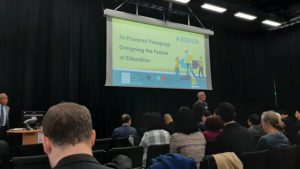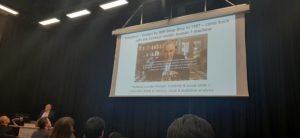Insights from DEFI’s Annual Event on AI-Powered Pedagogy at the Faculty of Education, University of Cambridge
Exploring the forefront of digital education, the Digital Education Futures Initiative (DEFI) event offered profound insights into the intersection of technology and education. These insights resonate with Access to Higher Education Diplomas, addressing crucial aspects of personalised teaching and learning, human-centric approaches and strategic planning in the age of Generative AI.
One of the highlights of the event was Dr. Alina von Davier's presentation on Duolingo's innovative framework for flexible test design using AI. It was particularly fascinating to learn how AI can interact in real time with test takers, guiding writing tasks and assessing abilities based on responses. This marks a significant leap in personalised learning assessment which they term PET-CAT Personalised Ensemble Test (PET) - Computerised Adaptive Test (CAT). As this framework continues to develop, we can envision how such tailored technologies could cater to the diverse learning needs of adult learners and facilitate smoother transition into HE.
Former Secretary of State for Education, Charles Clarke, delivered a compelling message on the nuanced integration of AI in education. His emphasis on tailoring AI implementation to individual subjects and the importance of strategic planning at the provider level, resonated as a clear directive to course leaders and senior leadership teams within educational organisations. His analogy likening the current AI hype to the hasty introduction of computers in UK educational institutions in the 1980s and 1990s underscored the necessity of consistent support and preparation to avoid potential pitfalls.
Get ready for a new buzz-word: "Humans-in-the-loop." This notion emphasises the indispensable role of human involvement in the transition towards automated teaching and assessment, highlighting the enduring value of human evaluation and empathy in the learning process. This is equally important in adult education settings, where guidance and personalised support play a crucial role in facilitating learning and learner well-being.
With the emphasis on the crucial role of humans in the educational process, the event also featured a showcase of AI-powered EdTech products. From tools that enhance teaching effectiveness to classroom management and student engagement, these promising initiatives offer pedagogic solutions for a diverse range of education providers. Below is a list of the EdTech products presented:
An earlier train of thought that underscores the value of dialogue and oral culture in education takes us to ancient Greece. Socrates was famously sceptical towards writing as a measure of true understanding. He famously remarked: "Writing, Phadeus... is very like painting; for the creatures of painting stand like living beings, but if one asks them a question, they preserve a solemn silence" (370 BCE).
This serves as a reminder of the limitations of the written word compared to the validity of verbal dialogue in cultivating and evaluating deep understanding. It reaffirms the significance of recent trends towards interactive participation and verbal assessments (viva voce - meaning ‘with living voice’) to establish a living relationship with knowledge where meaning can be ‘experienced’ rather than ‘represented’.
At CAVA, we support these recent trends and believe in encompassing various assessment types that provide opportunities for personal reflections through written work, semi-structured interviews, or guided discussions, aiming to establish meaningful learning experiences for our adult learners and to prepare them effectively for HE.
The insights gleaned from DEFI's annual event provide valuable consideration for stakeholders in the Access to HE sector. As we navigate this new frontier of Generative AI, it is essential to embrace innovation while remaining ethical and mindful of the enduring human elements that underpin effective learning and teaching practices, ie. the human-in-the-loop!
- Reflections by Nork Zakarian

One of the highlights of the event was Dr. Alina von Davier's presentation on Duolingo's innovative framework for flexible test design using AI. It was particularly fascinating to learn how AI can interact in real time with test takers, guiding writing tasks and assessing abilities based on responses. This marks a significant leap in personalised learning assessment which they term PET-CAT Personalised Ensemble Test (PET) - Computerised Adaptive Test (CAT). As this framework continues to develop, we can envision how such tailored technologies could cater to the diverse learning needs of adult learners and facilitate smoother transition into HE.
Former Secretary of State for Education, Charles Clarke, delivered a compelling message on the nuanced integration of AI in education. His emphasis on tailoring AI implementation to individual subjects and the importance of strategic planning at the provider level, resonated as a clear directive to course leaders and senior leadership teams within educational organisations. His analogy likening the current AI hype to the hasty introduction of computers in UK educational institutions in the 1980s and 1990s underscored the necessity of consistent support and preparation to avoid potential pitfalls.
Get ready for a new buzz-word: "Humans-in-the-loop." This notion emphasises the indispensable role of human involvement in the transition towards automated teaching and assessment, highlighting the enduring value of human evaluation and empathy in the learning process. This is equally important in adult education settings, where guidance and personalised support play a crucial role in facilitating learning and learner well-being.
With the emphasis on the crucial role of humans in the educational process, the event also featured a showcase of AI-powered EdTech products. From tools that enhance teaching effectiveness to classroom management and student engagement, these promising initiatives offer pedagogic solutions for a diverse range of education providers. Below is a list of the EdTech products presented:
- Twinkl - an AI-powered teacher’s toolbox with lesson plans, assessments and many other resources available to teachers
- Merlyn Minds - an AI assistant in the classroom guided by the teacher’s voice
- ClassIn - a one-stop interactive classroom experience
- Ludenso - an augmented reality (AR) platform bringing learning to life in 3D and with AR
- Speechmatics - AI speech technology for transcription and real-time translation
- Smart Learning - A Danish initiative that personalises learning for each learner
- TIST - a farmer support service in East Africa tackling climate change with education and tree-planting.
An earlier train of thought that underscores the value of dialogue and oral culture in education takes us to ancient Greece. Socrates was famously sceptical towards writing as a measure of true understanding. He famously remarked: "Writing, Phadeus... is very like painting; for the creatures of painting stand like living beings, but if one asks them a question, they preserve a solemn silence" (370 BCE).
This serves as a reminder of the limitations of the written word compared to the validity of verbal dialogue in cultivating and evaluating deep understanding. It reaffirms the significance of recent trends towards interactive participation and verbal assessments (viva voce - meaning ‘with living voice’) to establish a living relationship with knowledge where meaning can be ‘experienced’ rather than ‘represented’.
At CAVA, we support these recent trends and believe in encompassing various assessment types that provide opportunities for personal reflections through written work, semi-structured interviews, or guided discussions, aiming to establish meaningful learning experiences for our adult learners and to prepare them effectively for HE.
The insights gleaned from DEFI's annual event provide valuable consideration for stakeholders in the Access to HE sector. As we navigate this new frontier of Generative AI, it is essential to embrace innovation while remaining ethical and mindful of the enduring human elements that underpin effective learning and teaching practices, ie. the human-in-the-loop!
- Reflections by Nork Zakarian


